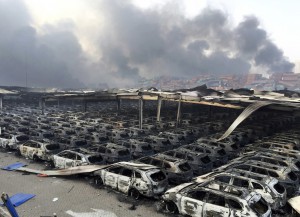With global leadership in the auto industry hanging in the balance, Toyota is set to resume production at a big assembly complex in the Chinese port city of Tianjin, which was rocked earlier this month by a huge explosion that killed more than 140 and created a crisis for the government of the Republic of China even as it scrambles to contain the country’s mounting economic woes.
The slowdown in economic growth across China, highlighted by the plunge in Chinse stock indices, has cut into new car sales across the country. But major global carmakers, such as Toyota, Volkswagen and General Motors still count on the Chinese market for a significant portion of the worldwide sales.
The unexpected shutdown came at a critical time for Toyota. The Japanese maker saw its global sales slip behind Volkswagen for the first half of 2015, and the loss of production in Tianjin could give its German rival a stronger run for leadership during the rest of the year.
Toyota said it is “gradually” restarting this week its manufacturing operations near the Chinese port of Tianjin, which has been halted since the deadly chemical explosions on August 12. Toyota said the blasts broke windows at its car assembly, logistics, and research buildings, while inuring 67 Toyota employees and damaging thousands of vehicles.
(For more on the damage wrought by the explosion, Click Here.)
The main Tianjin factory, which produces models including the popular Corolla, has about 12,000 employees and manufactured 440,000 vehicles in 2014, making it one of the largest Toyota plants in China.
At the time of the explosion, which created a crater so large it required aerial photographs to accurately measure, Toyota had shut down the assembly lines at the plant for a summer vacation period, which was extended after the blast.
Two huge explosions tore through a warehouse storing hazardous chemicals in the port of Tianjin, which is located on the Yellow Sea in northeastern China. Lax regulation of the handling of materials stored in the warehouses is being blamed for explosion, which killed more than 140, including scores of firefighers.
(GM takes heat over plan to import new Buick SUV from China. Click Here for the story.)
Authorities there were slow to release a list of the chemicals being stored, which included 1,300 tons of potentially explosive oxidizing chemicals.
Firefighters initially fought the blaze with water, which experts said may have combined with the chemicals to form an explosive gas.
Even as the clean-up in Tianjin continues, Toyota is moving ahead with the reopening of its big plant. Besides the Toyota vehicles damaged by the explosion, several hundred vehicles being imported into China by other companies, including BMW, Peugeot and Renault, were also destroyed or severely damaged by the blast.
(VW’s battle for sales leadership could be hurt by China’s slowdown. Click Here for more.)
Both Toyota and rival VW have become increasingly dependent upon China, despite that once-booming market’s unexpected 3% decline in sales so far this year. VW is the top-selling maker in China, but Toyota has been gaining ground, despite long-simmering political animosity between Japan and China. It has a goal of boosting sales there to 1.1 million vehicles annually.
Getting Tianjin back up to full speed could determine which of the two automotive giants comes out on top in global sales for all of 2015.
(Paul A. Eisenstein contributed to this report.)

